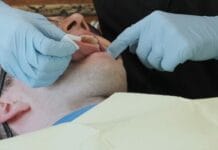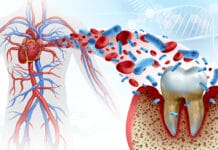Dementia impacts around 50 million individuals globally and is projected to double every two decades, making it a significant public health concern. Although dementia’s significance is increasingly recognized, there is no conclusive treatment available yet.1
Current knowledge about risk factors, such as smoking, physical inactivity, obesity, hypertension, and type 2 diabetes, accounts for only about 40% of dementia risk. Therefore, further research is needed to identify additional modifiable risk factors that could help in preventing or postponing the onset of dementia.1
A retrospective study aimed to explore the associations of dental diseases and oral hygiene care with the risk of dementia.1
The Study
The authors collected data from National Health Insurance Services (NHIS). The NHIS is the only insurer in Korea that provides mandatory, universal, comprehensive medical care to 97% of the Korean population. After reviewing and excluding participants based on exclusion criteria, 2,555,618 participants were determined to be eligible for this retrospective study.1
The cohort was monitored from the date of their health screening until they either developed dementia, passed away, or the study concluded on December 31, 2017, whichever occurred first.1
Oral examination was conducted by dentists evaluating the presence or absence of various dental conditions, including periodontal diseases, dental caries, and tooth loss. Periodontal diseases and dental caries were recorded based on their presence or absence, while tooth loss was classified into categories: 0, 1 to 7, 8 to 14, or 15 and above.1
Oral hygiene practices were documented through a self-administered questionnaire, which asked about the frequency of dental checkups, professional hygiene treatment, and tooth brushing habits. Tooth brushing frequency was categorized as either zero to one time per day or two or more times per day.1
The primary endpoint was newly diagnosed dementia during the follow-up period. Dementia was defined as Alzheimer’s disease, vascular dementia, or other forms of dementia.1
The Results
Having at least two types of dental diseases, such as periodontal disease, dental caries, and/or tooth loss, significantly increases the risk of developing all-cause dementia. Conversely, engaging in two specific oral hygiene practices, such as professional hygiene treatment and regular tooth brushing, was associated with a reduced risk of all-cause dementia.1
These findings were consistent for both Alzheimer’s disease and vascular dementia. Even among individuals with dental issues, maintaining oral hygiene could mitigate the risk of all-cause dementia. For example, periodontal disease combined with professional hygiene treatment was associated with a lower risk, as was periodontal disease with brushing twice daily. Additionally, having one to seven missing teeth combined with professional hygiene treatment or brushing twice daily reduced the risk. Similar patterns were observed for Alzheimer’s disease.1
Ultimately, this study found poor dental health consistently raised the risk of developing dementia, while good oral hygiene practices were associated with a reduced risk. Notably, the positive effect of regular tooth brushing was particularly significant among younger individuals. Since dental issues typically worsen with age, maintaining good oral hygiene from an early age could potentially delay the onset or slow the progression of dementia.1
While this study offers valuable insights, it also has some limitations. First, assessing professional hygiene treatment and tooth brushing frequency relied on self-reported questionnaires, which may lead to overestimation of oral hygiene practices.1
Second, data on long-term health behaviors was lacking, including changes in oral hygiene habits over time or in response to health conditions.1
Third, the study did not use Alzheimer’s disease biomarkers for the etiologic diagnosis of dementia, as it was based on epidemiological data. Consequently, there might be discrepancies between clinical diagnoses and those recorded in the claims data, potentially affecting the accuracy of the analyses.1
In Conclusion
In this comprehensive, nationwide, retrospective longitudinal cohort study, the authors found that periodontal diseases, dental caries, and missing teeth were each independently associated with the onset of dementia.1
Moreover, having two dental issues was found to significantly increase the risk of developing dementia compared to having just one. However, maintaining good oral hygiene through regular professional hygiene treatment and frequent tooth brushing was associated with the lowest risk of all-cause dementia, Alzheimer’s disease, and vascular dementia. These findings suggest that effective oral hygiene practices can help mitigate the risk of dementia associated with dental problems.1
Before you leave, check out the Today’s RDH self-study CE courses. All courses are peer-reviewed and non-sponsored to focus solely on pure education. Click here now.
Listen to the Today’s RDH Dental Hygiene Podcast Below:
Reference
1. Yoo, J.E., Huh, Y., Park, S.H., et al. Association Between Dental Diseases and Oral Hygiene Care and the Risk of Dementia: A Retrospective Cohort Study. J Am Med Dir Assoc. 2023; 24(12): 1924-1930.e3. https://pubmed.ncbi.nlm.nih.gov/37709259/











